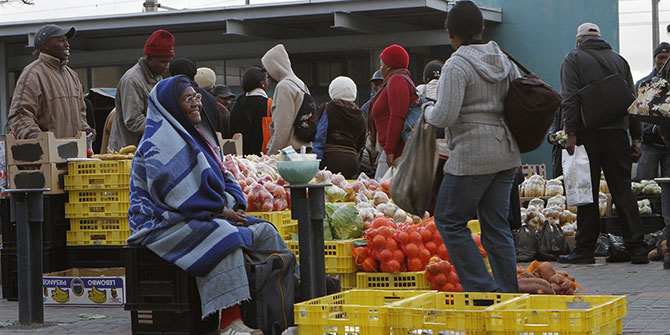As presented at a recent LSE Africa seminar, UCL’s Astrid Wood discusses the rising popularity of Bus Rapid Transit (BRT) in South Africa. The LSE Africa seminar takes place every Wednesday during term-time and is open to academics, research students, policy-makers at LSE and beyond.
BRT is quickly becoming the universal policy fix appropriate within a wide variety of geographical and socio-political contexts to tackle an assortment of local predicaments. For transport geographers, BRT is a rapid mode of urban public transport that combines the high-quality and speed of a rail system with the operating flexibility and low-cost of a bus network. It is a rubber-tired form of rapid transit including stations, busways, vehicles, intelligent transport systems, operational and financial plans with integrated ticketing and a branded identity. For urban geographers however, and specifically this study of peripatetic planning, BRT is a dynamic policy model, made and remade through its global circulation and actualized through both its territorial and relational attributes.
In 2006, BRT fever swept through South Africa. Within three years of learning of the Bogota BRT model, both Johannesburg and Cape Town had implemented new BRT systems with four other cities (eThekwini, Nelson Mandela Bay, Rustenburg and Tshwane) in various stages of the planning and implementation process.

An information cascade describes a progress whereby people make decisions based on the actions of their predecessors assuming those that came before them had access to accurate information. In the classic conundrum concerning the preeminent restaurant, each diner has different information regarding which restaurant is better but the system breaks down when people start making decisions in sequence rather than simultaneously. Because much of the information is subjective and imperfect, people may choose one place over the other simply because one is more crowded or has better lighting.
Information cascades offer cities an opportunity to learn from others but this type of learning becomes problematic when people stop following their own private information and simply listen to the information flows. What tends to happen is that people simply assume that all the information they are receiving is accurate and stop evaluating it within their local context.
That is not to say that BRT is not the optimal solution to South Africa’s transportation challenges or that South African policy actors somehow misinterpreted the BRT model. Rather my analysis suggests that the process of adoption is circular, uncertain and sometimes chaotic with an assortment of learning happening simultaneously and consecutively thereby leading to the central argument, which states that policy circulation varies considerably between jurisdictions in accordance with local conditions.
This is a study of the global circulation of successful policy innovations with a focus on South African adoption of BRT policies originating in South America and circulating through the urban context between 2006 and 2012. The BRT model, publicized by Bogota’s successful implementation of TransMilenio, was a critical influence on South Africa but the process through which BRT circulated and adopted locally demands further study.
My analysis explores the circulation of BRT along a range of issues including the various responses to the model, policy actors involved, local context and prior experiences with the model, to understand the current responses to BRT circulation. My methodology included interviewing those involved in metropolitan, regional and national government as well as non-governmental actors in consultancy, the academy and industry both inside and outside South Africa to understand their experiences, opinions and decisions that led to BRT adoption. Rather than focusing on the particulars of BRT from a transport perspective, my arguments elaborate on recent urban policy mobilities scholarship calling attention to the individuals and assemblages involved in the circulation and interpretation of global policy models.
The LSE Africa seminar series takes place every Wednesday during term-time in room CLM 2.05 (Clement House, The Aldwych) from 4 to 5.30pm and is open to all academic staff, research students, researchers and policy makers at LSE and beyond.






